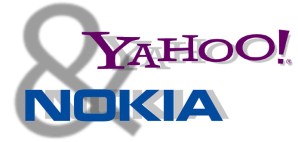
Internet giant Yahoo and mobile phone titan Nokia have collaborated on software and services for more than five years, and today the companies announced a major expansion of that pact: Yahoo will become the exclusive provider of email and chat services provided under Nokia’s Ovi suite of services, while Nokia will become the exclusive provider of mapping and navigation services for Yahoo. The companies have also promised with work out “ID federation” between their two families of service, so Nokia customers with Ovi IDs will be able to tap into Yahoo properties directly without having to set up another Yahoo account. The partnership will of course cover mobile mapping and messaging services, but will also cover sites and services aimed at traditional PCs.
The partnership could be good exposure for both companies: although Nokia dominates the mobile phone industry globally, it has had trouble cracking the North American market, particularly in the smartphone arena. However, Nokia has had tremendous success bringing mobile phones and data services to emerging markets: the partnership could mean that millions of mobile email users’ first experience of Internet email and chat will come by way of Yahoo.
“Delivering great user experiences—both online and on your mobile—is what this alliance is all about,” said Nokia CEO Olli-Pekka Kallasvuo, in a statement. “We’re enabling millions of Yahoo customers in key markets including North America to discover the unique capabilities that Ovi Maps brings. Similarly, Yahoo’s online expertise will bring exciting mail and messaging enhancements to millions of Ovi Mail customers across almost every country around the world.”
The companies anticipate the first co-branded services will launch in the second half of 2010, with the full set of services going live in 2011.


